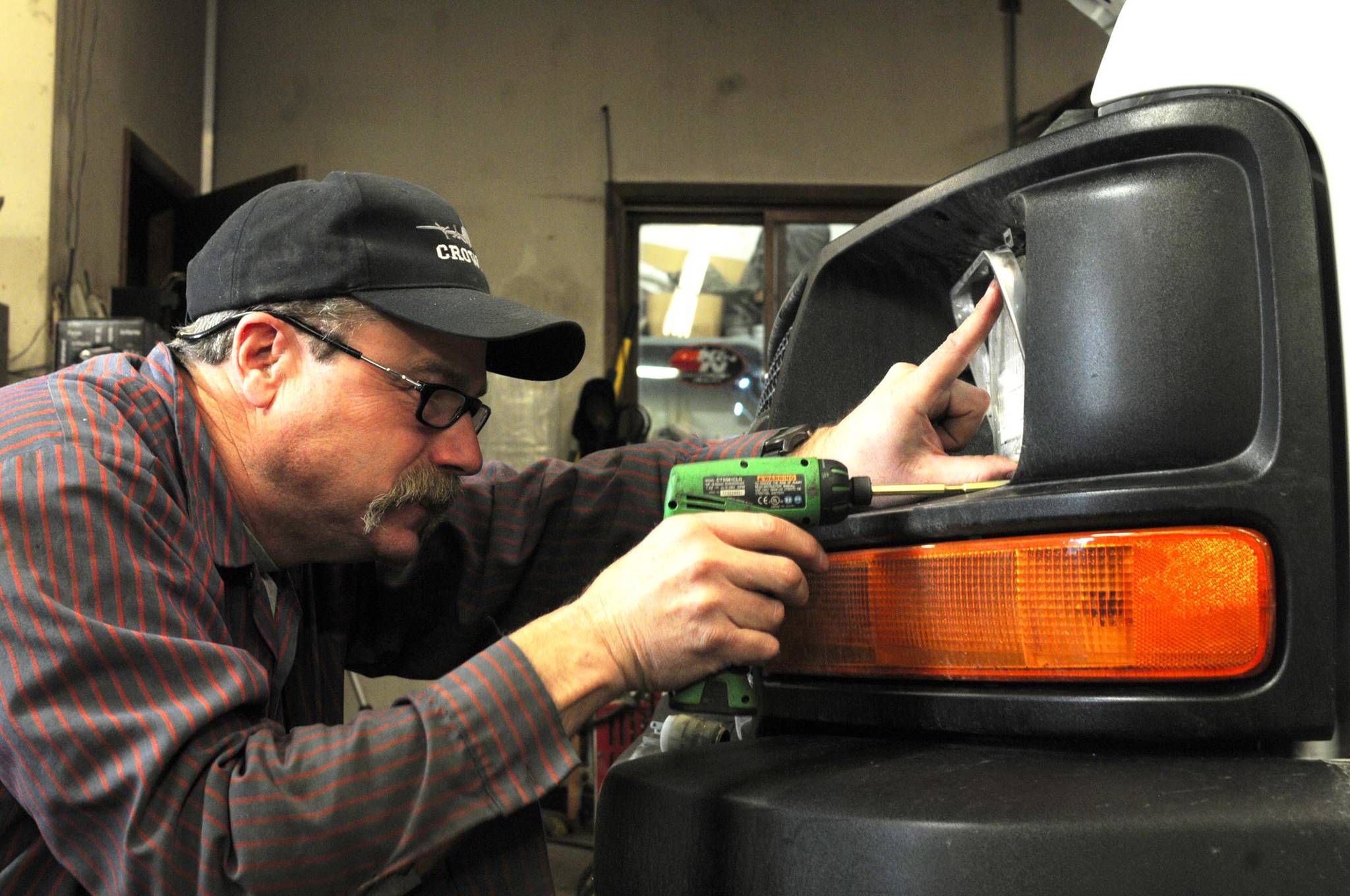A mismatched collection of items welcomes visitors to Gary’s Auto Electric. A dog the size of a black lab puppy but with grey hair around her muzzle and paws comes scampering out of the back, energetically chasing a ball. Car batteries line the front window display and alternators stretch along a table toward the back bay. Plastic placemats with cartoons color the countertop, while bright holiday cards hang all around the room. A solar panel gleams near the front counter.
It shares its variety with its owner, Gary Dawkins, who has about as varied a story as they come — from trapping to gold mining to construction to renewable energy.
After more than 30 years in the business, though, the auto electric shop won’t be part of it anymore. Dawkins plans to close the shop today, with one final opening planned for Jan. 15, 2018 to help clear out the remaining items. He’s planning to stick around Soldotna, though he said he wasn’t sure what would happen to the building yet.
“I don’t think there will be an auto electric shop here anymore,” he said. “I did try (to get someone to buy it and start one).”
He originally arrived from the Lower 48 in the Matanuska-Susitna Valley as he thought his life was ending — he’d suffered formaldehyde poisoning at a previous job and been given two years to live, he said. So, he decided to see Alaska and sent out job applications before heading north.
He landed a job on a dairy farm, he said. The owners set him up with a living situation and pay to watch their cows, he said.
“It was the greatest deal ever,” he said. “… (One of the owners) said, ‘There’s a pickup. If you fix it, you can drive it.’ His wife drove me into town to get parts.”
He already had some background in auto work in his father’s auto electric shop, where he started working when he was 14. Since then, he’d worked in a scattershot of other jobs, learning computers, studying geothermal work and firefighting. He picked up another skill — insulating buildings — and came to work on the central Kenai Peninsula. It was good work, as he was the only bonded and licensed insulator on the peninsula at the time, he said.
However, Alaska’s boom and bust economy soured in the mid-80s as oil prices cratered. He jumped out of the construction business and bought a business from a man in North Kenai that would become Gary’s Auto Electric, now situated on Kalifornsky Beach Road near Kenai Peninsula College.
Despite the economic downturn, it was a good time to get into the business, he said.
“When everything is good, people buy new. When everything is bad, people fix,” he said. “When I started, everything was bad.”
Business built steadily on the auto electric side, with a healthy customer base among the commercial fishermen who needed work on their equipment and from snowplow operators. Shortly after opening, he began selling and installing solar panels and wind turbines, too.
The renewable energy side of the business has grown over the years, and Dawkins said he worked with legislators and Gov. Sarah Palin to get Homer Electric Association to open up its system to allow private renewable energy generation. During the summer, he sometimes spends the weekends installing setups on the far side of Cook Inlet or working on setups. Next summer, he said he’ll continue to do renewable energy work, his 28th season.
It’s not the only way he’s kept busy. Besides being a golfer, he’s also a sportfisherman and chaired the Kenai/Soldotna Fish and Game Advisory Committee for about a decade, resigning in 2009. The committee reviews proposals to be considered by the Board of Fisheries and the Board of Game and provides feedback on local fish and game issues. He also served on an advisory committee for game in the Interior for several years, he said.
Although he said he loved the work, the notoriously intense political conflict in the fisheries world drove him to quit, as well as the larger ongoing issues with access to public land in Alaska, he said.
“My first (consideration) was always the fish,” he said. “… When you’re managing resources, you have to be fair.”
Despite the conflict within fisheries, he said he had a good relationship with the commercial fishermen in part because he knew many of them as customers at the shop. Dyer VanDevere, who worked with Dawkins on the advisory committee and who fishes commercially, said he didn’t remember any conflict with him.
“He’s a pretty levelheaded guy about everything,” he said.
But primarily, the first place he met Dawkins was in the shop. It was the same for Mike Chenault, who represents Nikiski in the Alaska House of Representatives and sometimes competes against Dawkins in community golf tournaments. It makes sense, in a small community, when people get involved in a variety of things, he said.
“(Dawkins) is no different — he was involved from a lot of things, whether it was renewable energy, or just helping people with everyday problems, keeping them on the road,” Chenault said. “… That’s where I think he built his knack in the community — he was very customer-orientated and kind of do what you needed to get you back on the road.”
Dawkins said he’s not entirely sure what’s coming next for him, other than working on renewable energy next summer. One thing he’s sure of, though — no more politics. People have asked him if he would consider running or getting involved in politics at some level.
“Not interested,” he said. “I’ve had enough of that.”
Reach Elizabeth Earl at elizabeth.earl@peninsulaclarion.com.

